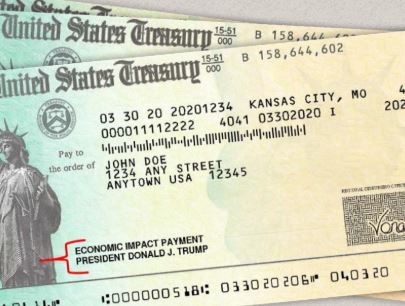By: Madison Anderson
The economic repercussions of COVID-19 continue to be deeply felt by Americans, especially those out of work. Meanwhile, the country’s leaders are trying to figure out a way to keep the economy afloat by granting stimulus checks to those who qualify. The Trump administration sent out the first round of stimulus checks, part of the Coronavirus Aid, Relief, and Economic Security (CARES) Act, adding up to $300 billion in March of this year with hopes of stimulating the economy, but not everyone thought that was a good idea.
“I believe the only reason he signed on was because he saw an opportunity to fleece the American people with loans that he and his friends will never pay back. I do agree it was essential though, just poorly crafted,” said Carl Zimmerman, former Florida State Representative, and retired public school teacher.
Economic Impact Payments were directed to millions of Americans across the country in response to the coronavirus pandemic. These stimulus checks provided $1200 to those who filed 2019 tax returns as single and $2400 to married couples filing jointly. An additional $500 per child (up to 4) was included and the corresponding income limits were $75,000 for singles and $150,000 for couples (head of household limit was set at $112,500).

“My wife and I qualified for about $2200 and we used it to pay bills”, Zimmermann said.
The purpose of the checks was to benefit the economy by providing funds to American households. The spending of these checks was left to the discretion of the recipients.
Julie Quezada, a registered nurse from California used her family’s check to purchase more homeschool supplies and put the rest towards savings.
“For my family and I, the stimulus checks were not essential, but they boosted the morale of the country and it did help people cope with the loss of freedoms and work during the initial stay at home orders,” Quezada said.

Months after the first stimulus checks were distributed, the impact of COVID-19 remains. With 50% capacities on a substantial portion of businesses, a large portion of the workforce remains at home.
“I think a second check would be beneficial. It helps the country’s morale, to be honest, it brings people’s tempers and anger down a bit during this crazy, isolating and mask-wearing time,” Quezada said.
Presently there is a debate between two plans for the second stimulus package. The Health, Economic Assistance, Liability Protection, and Schools (HEALS) Act is being proposed by the Senate and the Health and Economic Recovery Omnibus Emergency Solutions (HEROES) Act is the House’s proposal.
Jolissa McMenamin, a homeschool mother from Ohio also used her CARES money in a number of ways.
“I do think it was essential for the businesses that were forced to shut down. We used ours to pay off debt and stockpile some more supplies,” McMenamin said.
Some families are wary that requirements for the second check will be not as lenient and that fewer people will receive the benefits.
The qualifications for the HEALS Act has some similarities to the CARES Act with notable changes for dependents. Originally, only children under the age of 17 were eligible for the primary dependent payments of $500. Children 17 and older, including college students, and adults claimed as dependent on someone else’s tax return will now be entitled to those payments. The CARES Act excluded non-citizens who did not have a social security number and the HEALS act includes the same limitation.
The $3 trillion HEROES Act proposed by the House in May of this year would be available to filers without a social security number and would give eligible dependents up to $1,200 as opposed to the $500 proposed in the HEALS.
In response to the possibility of a second stimulus, McMenamin said “In the end, I would have to know what strings are attached to the money.”
The HEALS Act proposed by the Senate and the HEROES Act proposed by the House must be presented and deliberated among the Republican and Democratic parties.
These bills will be debated in a conference between the Senate and the House of Representatives until a final decision is made. The agreed-upon proposal will be turned into legislation and passed to President Trump for approval.
While the House and Senate have opposing views on amounts of the stimulus as well as distribution rules, both bodies of Congress agree that relief is needed. As for the American households receiving the stimulus, how individuals and families choose to use it is still a freedom of choice.
This column originally published in August, we still have no stimulus.
Publishers Note: While The Free Press will always be free for our readers, and ad-supported, we are asking our loyal readers to consider a monthly donation of $3 to maintain our local journalism and help us grow, as we ramp up ad sales locally.
You can click here to support us.
We thank you all for your consideration and supporting local journalism.
